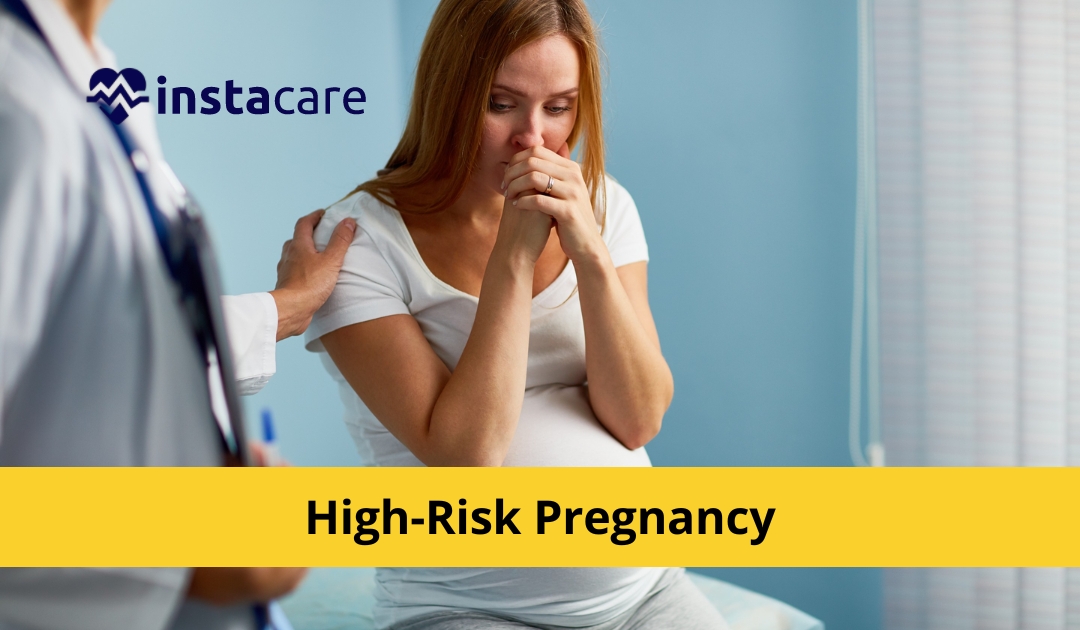As expecting parents, it is normal to feel overwhelmed when you are facing a high-risk pregnancy. Whether you already knew about the risks coming into this journey or if this has come as a surprise, we understand that these emotions can be difficult to manage. To help ease any anxieties or fears associated with your current circumstances, today's blog post will cover everything you need to know about a high-risk pregnancy and provide valuable resources to ensure that both mom and baby remain healthy during this special time.
What is a high-risk pregnancy?
A high-risk pregnancy is a pregnancy that is deemed to have an increased chance of developing issues during the gestational period. There are several factors which can make a pregnancy considered a "high-risk" such as maternal age, pre-existing medical conditions, and multiple birth pregnancies. During high-risk pregnancies, the mother's health may require additional monitoring throughout the duration of gestation to ensure the baby's safety and health. There are a variety of tests that may be recommended in order to check for certain risks or changes in the mother's well-being such as regular ultrasounds, blood tests, and genetic screening. Close attention from both the mother and healthcare provider may also increase the chances of a successful delivery outcome. Therefore, it is important for pregnant women to discuss potential concerns with their healthcare team.
How common is high-risk pregnancy?
High-risk pregnancies are unfortunately more common than many realize. While commonly seen in older mothers, younger women can also experience high-risk pregnancies due to medical conditions or lifestyle choices. In some cases, underlying health issues that weren't present before conception can arise and place mother and child at risk. Additionally, certain lifestyle habits such as smoking, drinking alcohol, and drug use can increase the chance of complications during pregnancy and delivery. Because of the many factors that need to be considered when determining if a pregnancy is high risk, it's important for expecting mothers to receive regular care from their healthcare provider throughout the process.
What causes high-risk pregnancy?
High-risk pregnancy occurs when a woman experiences health complications during her pregnancy that could potentially endanger the mother or baby's wellbeing. These complications, which can be genetic or acquired, include medical conditions such as diabetes, hypertension, abnormalities in the urinary system, epilepsy, and obesity. They can also arise from lifestyle choices such as smoking and excessive drinking or drug use during pregnancy. Age also plays a factor in high-risk pregnancies since women aged 35 or older are more likely to experience complications due to biological changes that occur with age. Ultimately, any kind of behavior or variable that might cause harm to either the baby or the mother is considered to be a risk worth taking into account for an expecting mother.
Signs and symptoms of high-risk pregnancy
High-risk pregnancy refers to a pregnancy with an increased chance for complications or medical problems for the mother, the baby, or both. Examples of conditions that put a woman into the high-risk category include being over 35 years old and having twins, diabetes, high blood pressure, anemia or any autoimmune disorder. The most common signs and symptoms associated with high-risk pregnancies are vaginal bleeding, swelling in the extremities, dizziness or fainting spells, contractions that are more frequent and strong than Braxton Hicks contractions, pelvic pressure accompanied by a low backache, fluid leakage from the vagina and decreased fetal movement. Women should contact their doctor whenever any of these warning signs occur as prompt treatment can make a big difference in terms of ensuring a healthy outcome for both mother and baby.
Risk factors for a high-risk pregnancy
A high-risk pregnancy is a term that describes when an expecting mother or her unborn baby face a higher than average risk of complications due to certain conditions. Certain situations may increase the chances of such a pregnancy and are therefore known as risk factors. These may include age (if the mother is 35 or older), carrying multiple babies, pre-existing health conditions such as diabetes and high blood pressure, poor nutrition, environmental exposures, and also smoking or drinking alcohol while pregnant. It is important to address any potentially negative lifestyle choices or health conditions before attempting to get pregnant to ensure that both mother and baby stay safe during pregnancy. Routine visits to the doctor will help identify potential risks for those with a higher chance for complications. By taking preventative measures, mothers can reduce their chances for experiencing complication during their pregnancy.
Existing health conditions
Having an existing health condition can put you at risk for a high-risk pregnancy. Risk factors that can increase your chances of having a high-risk pregnancy include pre-existing conditions such as diabetes, hypertension, lupus, and asthma. These conditions can affect the mother's body during pregnancy, causing health issues and potential harm to both mother and baby. In some cases, these conditions can also cause difficulty during labor or may even result in premature birth. Furthermore, it's important to be aware of the medications taken before conception, as some medicines are not safe for pregnant women or the developing fetus. Keeping up with regular checkups to maintain good health is especially important for those with pre-existing conditions in order to ensure the best possible outcome from their pregnancy.
View More: 10 Best Exercises for Normal Delivery
Overweight and obesity
The cause of obesity is often multifactorial, and can include factors such as genetics, lifestyle and psychological factors. Poor diet, lack of physical activity, or even certain medication or medical conditions can contribute to an increase in weight. For women of reproductive age, being overweight or obese carries an increased risk of a high-risk pregnancy. Risk factors include having diabetes prior to pregnancy, hypertension during pregnancy and complications such as pre-eclampsia during delivery. As these risks can be greater for those who are overweight or obese when they become pregnant, it is essential for women to maintain a healthy weight before planning on becoming pregnant.
Multiple births
Having multiple babies at once can be a joyous occasion, but it does come with certain risks. Risk factors for having a high-risk pregnancy when delivering multiples include the mother's age, any health conditions she may have, and her body mass index. For instance, a woman over 35 is more likely to experience complications from both the pregnancy and delivery than someone younger. If a mother has certain health conditions such as diabetes or hypertension, she may need extra monitoring or care to ensure enough nutrition and oxygen reaches the fetuses. Finally, too much weight can also increase a mother's risk of having a high-risk pregnancy. It is important for expectant mothers experiencing multiple births to stay aware of these risk factors to help them prepare adequately prior to delivery.
Young or old maternal age
Having a baby at either an older or younger maternal age can have varying risks and consequences depending on several factors. Risk factors for those having a high-risk pregnancy may include advanced age, poor health status, inadequate prenatal care, lack of education and sufficient financial resources or access to healthcare. Women under the age 15 or over the age of 35 are seen as being at higher risk for certain complications including increased rates of fetal death, growth and development issues as well as maternal medical concerns. It's important for women to be aware of their own individual risk factors to better prepare themselves when considering motherhood regardless of age.
How is high-risk pregnancy diagnosed?
High-risk pregnancy is often diagnosed during a routine, initial pregnancy screening. During this screening, medical professionals will review a patient’s medical history, ask questions about the mother’s lifestyle, and check vital signs to evaluate the overall health of the mother. Regular ultrasounds are scheduled throughout the pregnancy to assess and monitor how the fetus is developing, as this can help detect potential complications or issues early on. Additional screenings, such as detailed ultrasound exams or blood tests may also be provided depending on a doctor’s assessment. Ultimately, through standardized protocol and regular assessments and testing obtained during a high-risk pregnancy protocol, medical providers are able to diagnose any potential complications in advance.
How is high-risk pregnancy managed?
High-risk pregnancy is managed through personalized care based on the individual's specific needs. Expectant families go through extra testing, thorough screenings, and additional prenatal appointments in order to reduce the risk of complications during pregnancy and delivery. Additional prenatal visits help healthcare providers to identify any issues or potential problems early and take preventive measures or provide immediate treatment whenever necessary. Nutrition, physical activity, stress reduction, taking medication if necessary, good communication with healthcare providers, attending all regular medical appointments - these are some of the strategies that can be employed for a successful high-risk pregnancy. With good antenatal management and regular checkups, the chances of complications significantly decrease ensuring a safe delivery.
How can I prevent a high-risk pregnancy?
Preventing a high-risk pregnancy is a priority of any expecting mother, as such pregnancies can come with potentially serious complications. Following a healthy lifestyle is one of the best ways to reduce the likelihood of having a high-risk pregnancy. Eating well balanced meals and taking prenatal vitamins regularly, avoiding unhealthy habits like smoking or drinking alcohol, and exercising moderately are all important steps towards helping prevent complications during pregnancy. Additionally, receiving proper medical care from obstetricians and other health care providers is also crucial in ensuring that both mother and baby remain safe through the duration of the pregnancy. Taking preventive steps before getting pregnant can also make it much less likely to encounter any potential problems during the course of the gestation period. Doing research about healthy habits for expectant mothers could go a long way in helping prevent a high-risk pregnancy.
Conclusion
If you are currently pregnant or think you may be at risk for a high-risk pregnancy, it’s important to educate yourself on the topic. There are many different factors that can contribute to a high-risk pregnancy, and understanding them can help you better manage your own health and well-being during this special time. Be sure to talk to your doctor about any concerns you have and heed their advice when it comes to keeping yourself – and your baby – safe throughout your pregnancy journey.
Please book an appointment with the best Gynecologist in Lahore, Karachi, Islamabad, and all major cities of Pakistan through InstaCare, or call our helpline at 02137136090 to find the verified doctor for your disease.












